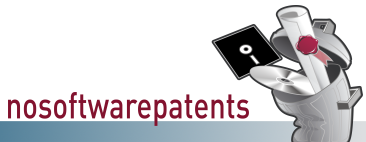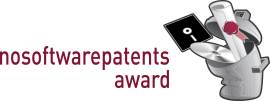| English | Deutsch |

![- Logo]](../images/layout007-small.png)
| Home |
| Software Patent of the year 2006 |
| About |
| Supporters |
| Background |
| News |
| Press November |
| Links |
| Contact |
| Imprint |
Oliver Lorenz (Emcita) comments on the election of patent EP1044400 to be "software patent of September":
Basically, this provides an internet based service for selectively updating the graphic user interface of a programmable control device. (From Brief summary of the invention, page 4 of the patent specification, filed in September 1999, US priority September 1998, owned by Philips)Commentary
The patent 1044400 is another example for what is wrong with EPO's registration practise – completely out of boundary after giving up technicality as the pre-requisite for a patentable invention. Technicality is the foremost condition of patentability in European patent law. It is meant to assure that not every new idea qualifies as an invention, just as the exclusion of software from patenting shall draw the line between what falls under patent law and what is subject to copyright protection.
So called technicality is the only criteria to assess the quality of what should be patented. Only those ideas which move scientific knowledge forward a significant step, and thus disproportionately contribute to the growth of particular knowledge, shall be rewarded a 20 year monopoly. Luckily, many people daily have ideas useful in commerce – this idea to update a remote control over the internet may be one. But they should not be exempted from, but contribute to competition in the market place from the first day of their conception, not become subject to exclusionary rights of a single agent.
The EPO's recent practise of accepting as technical any conception that somehow involves an electronic device, a computer or an internet connection, has effectively left the office without a measure for determining whether a novelty advances the state of the art. Or if the patent application objectively includes a novelty. That is because only the field of natural science (as opposed to business logic or artistic creativity) provides us – including patent examiners – with guidelines that are universally agreed upon. Only laws of an experimental science can be relied on to assess the state of the art - the level of established knowledge against which an idea can be measured objectively. We, and that is foremost the patent office, needs such a gauge to see if an idea really departs from current knowledge – in the right direction, and sufficiently far to merit a patent.
The objectivity of natural sciences is so important also, because it assures that a patent can be verified by others. Patent law lives from and off the knowledge of prior art. Everybody familiar with the matter must be able to agree on the newness of an idea, so the law. (That is different in copyright, where newness may be subjective because copyright aims individual creations.) It is unacceptable (because impossible) that the patent office asks industry to accompany and counter-check its prior art search, if it previously abandons the only useful search criteria.
This Philips patent is paradigmatic for the state of affairs at EPO: using a computer and an internet connection – pre-existing at the time of the "invention" – to send data to a remote control – also previously known – may be a useful business scheme. Someone certainly thought of it first – if not necessarily the alleged inventor – but how is it different from passing word over a telephone, then doing what the caller says. How does the office decide whether updating a client from a server over the intranet would be different from updating a remote control over the internet, if someone asks for it?
A 20 year monopoly for Philips' idea is medieval, and that is because the EPO's registration practise is.
When the EPO accepts bogus language circumventing the technicality provision, it abandons the essential concept of patent law. It unbalances the entire conception of an intellectual property system it is supposed to guard. And because property is definite, any time it hands out a patent like this, it takes away from others – common property. It doesn't matter if the office is bending to industry demand, or as some allege, follows an own agenda of gaining economic influence – as suggests claim (N°5) for an "implementation of the patented method in a software program" despite the formal interdiction of doing that – it is clearly abusing power.
A patent office which either cannot, or does not want to fulfil its function to tell what is patentable from what is not, ultimately influences economy - and society - in an extremely negative way. This is unacceptable. In the context of the current discussion on EPLA in Strasburg and Brussels, the importance of establishing and maintaining close democratic scrutiny over this institution, is more crucial than ever.
Emcita (European Media, Communication and Information Technology Association) was established two years ago in Berlin on the initiative of small and medium-sized companies (SME) and was involved actively against the controversial software patent directive, which in July 2005 was rejected in second reading by the European Parliament. Emcita advocates fair competition. By means of information and clarification Emcita challenges the efforts of large companies to influence the political shaping of public opinion. In the field of industrial property protection the organisation campaigns for a fair balance between commercial interests and public interests to facilitate access to knowledge in our information society.
| Previous Software Patents of the Month |
| > September |
| > August |
| > July |
| > June |
| > May |
| > April |
| > March |
| Press Archive |
| > Oktober |
| Philips | |
| EMCITA |
| > September |
| > August |
| > July |
| > June |
| > May |
| > April |
| > March |
